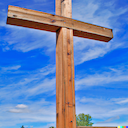The Holy Apostles of the Seventy Silas, Silvanos, Crescens, Epenetus and Andronicus were disciples of the Savior.
Saint Silas was a respected figure in the original Church at Jerusalem, one of the “chief men among the brethren” (Acts 15:22). The Council of the Apostles was convened at Jerusalem in the year 51 to deal with the question of whether Gentile Christian converts should be required to observe the Mosaic Law. The Apostles sent a message with Paul and Barnabas to the Christians of Antioch, giving the decision of the Council that Christians of Gentile origin did not have to observe the prescriptions of the Mosaic Law. Nonetheless, they were told that they must refrain from partaking of foods offered to idols, from things strangled and from blood, to refrain from fornication (Acts 15:20-29). Together with Saints Paul and Barnabas, the Council of the Apostles sent Saints Silas and Jude to explain the message in greater detail, since they both were filled with the grace of the Holy Spirit. Saint Jude was later sent back to Jerusalem, but Saint Silas remained at Antioch and zealously assisted Saint Paul, the Apostle to the Gentiles, on his missionary journeys preaching the Gospel. They visited Syria, Cilicia, and Macedonia.
In the city of Philippi they were accused of inciting unrest among the people, and for this they were arrested, beaten with rods, and then thrown into prison. At midnight, when the saints were at prayer, suddenly there was a strong earthquake, their chains fell off from them and the doors of the prison opened. The prison guard, supposing that the prisoners had fled, wanted to kill himself, but was stopped by the Apostle Paul. Then, he fell down trembling at the feet of the saints, and with faith accepted their preaching about Christ. He then led them out of the prison and took them to his own home, where he washed their wounds, and was baptized together with all his household.
From Philippi Saints Paul and Silas proceeded on to the cities of Amphipolis, Apollonia and Thessalonica. In each city they made new converts to Christ and built up the Church.
At Corinth the holy Apostle Silas was consecrated as bishop, and worked many miracles and signs, and there he finished his life.
The Holy Apostle Silvanus preached the Word of God together with the chief Apostles Peter and Paul. In his First Epistle, the holy Apostle Peter makes mention of him: “By Silvanus, a faithful brother to you, as I suppose, I have written briefly…” (1 Peter 5:12). Saint Silvanus was made bishop at Thessalonica and died there a martyr, having undergone many sorrows and misfortunes for the Lord’s sake.
The Holy Apostle Crescens is mentioned by the holy Apostle Paul (2 Tim. 4:10), saying that Crescens had gone preaching to Galatia. He was made bishop there, and afterwards he preached the Word of God in Gaul (modern-day France). In the city of Vienna (modern Austria) the holy Apostle Crescens established his student Zacharias as bishop. Having returned to Galatia, he died as a martyr under the emperor Trajan (98-117).
The Holy Apostle Epenetus was made bishop at Carthage. In his Epistle to the Romans, the holy Apostle Paul writes: “Greet my dear Epenetus, who is the firstfruits of Achaia unto Christ” (Rom. 16:5).
The Apostle Andronicus is mentioned by Saint Paul: “Salute Andronicus and Junia, my kinsmen, … who are of note among the Apostles, who also were in Christ, before me” (Rom. 16:7). The holy Apostle Andronicus was bishop in Pannonia (modern-day Hungary).
Apolytikion
O Holy Apostles, intercede to our merciful God, that He may grant our souls forgiveness of sins.
Kontakion
You were revealed to be branches of the vine of Christ, O wise ones, bearing clusters of virtues that pour out on us the wine of salvation. Receiving it, we are filled with gladness, and we celebrate your most honored memory, apostles of the Lord, Silas and Silvanus. Therefore, intercede that great mercy and remission of sins may be granted to us.

